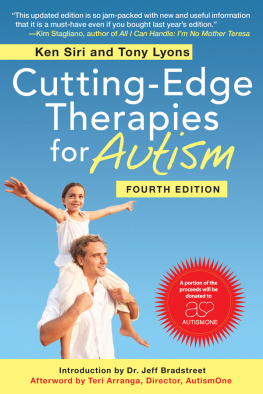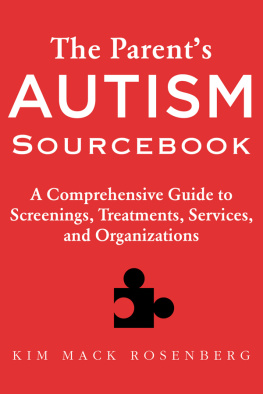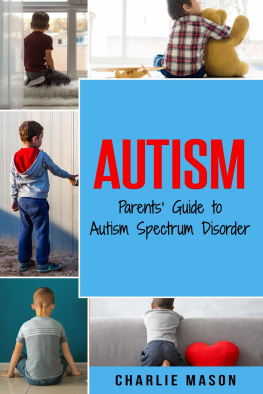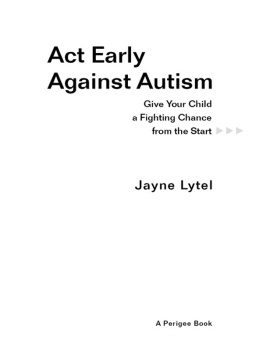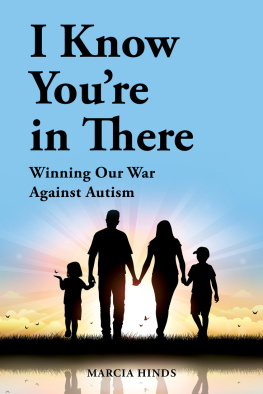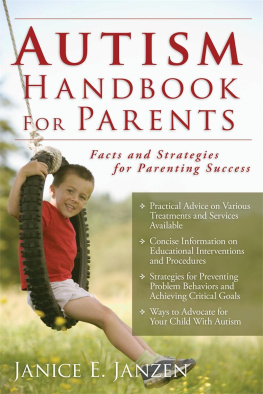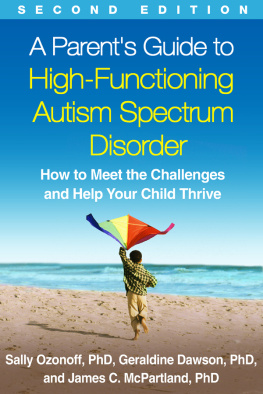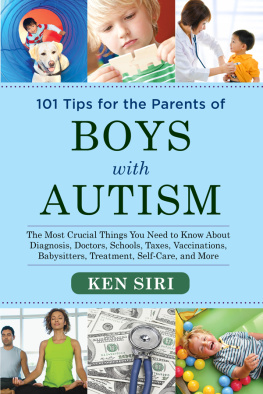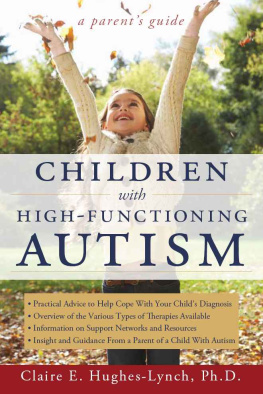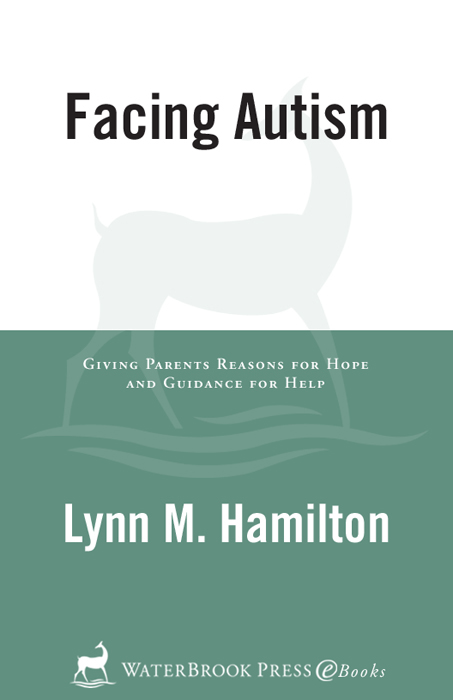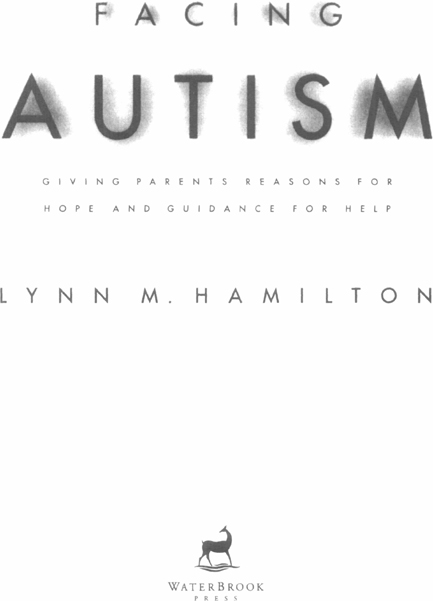
Parents and Professionals Alike
Give High Praise to Facing Autism
Patients and parents have often been among the best teachers in my quest to become a better doctor. This has been especially true of families facing autism. In Facing Autism, Lynn Hamilton has created a book that is both a practical primer for such families and a wonderful tribute to parents as the best teachers of other parents.
J OHN B OHN , M.D.
Ryan Hamiltons pediatrician, U.W. Health Physicians Plus Middleton, Wisconsin
Facing Autism is a book I would eagerly share with families of children newly diagnosed with PDD/autism. It is, as the tide implies, proactive and positive. It is written by a remarkable woman who would have loved to have access to such a book just a few short years ago when her son was diagnosed with autism. Parents of young children with autism will glean a direction for intervention from this comprehensive compendium of diagnostic issues and intervention options.
M ARJORIE A. G ETZ , P H .D.
developmental specialist, Lutheran General Childrens Hospital Park Ridge, Illinois
I heartily recommend Facing Autism. Lynn Hamilton has done a superb job of assessing the many treatment options offered to parents of autistic children. She describes them clearly and engagingly. An excellent book!
B ERNARD R IMLAND , P H .D.
director, Autism Research Institute
Lynn Hamilton does a very good job of summarizing the medical and nutritional therapies available for people with autism and PDD. Therapists and parents will be very pleased with this book.
D R . W ILLIAM S HAW
author of Biological Treatments for Autism and PDD
Reading Lynns book is like having a long, friendly, and supportive conversation with someone who understands. The research is meticulous and expansive, yet the book is a delight to read. After reading Facing Autism, you will feel that you have gained a new friend and valuable insights into treating your childs condition.
S USAN K. W ALUTSCH
mother of child with autism
Lynn Hamilton shows a clear understanding of Applied Behavior Analysis and its role in the treatment of children with autism. Her writing should be most helpful to parents who must make their way through the maze that autism presents.
J OSEPH E. M ORROW , P H .D.
president, Applied Behavior Consultants Sacramento, CA
In Facing Autism, Lynn has endeavored to be as accurate as possible in describing the several approaches that she felt were helpful in Ryans treatment and has had experts review what was written. The book is therefore somewhat unique in that it represents the input of a variety of experts who think quite differently about autism, but whose collective work contributed to a positive outcome for one little boy. Both parents and professionals working with autistic children will find this interesting reading.
D R . G LEN O. S ALLOWS
psychologist and director, Wisconsin Early Autism Project Madison, Wisconsin
Facing Autism is a book that every parent of an autistic child should read, particularly those parents whose child has been newly diagnosed with the disorder. Lynn weaves together personal accounts and the different treatment modalities used with her son, Ryan. The book is both a resource guide and a compelling narrative of one familys courageous journey.
J EAN M UCKIAN , RN, BSN
U.W. Health Physicians Plus Middleton, Wisconsin
This book is dedicated to our precious children
Ryan and Tori
for whom we would climb any mountain.
C ONTENTS
15.
F OREWORD
A book you like becomes your friend. If you are the parent of an autistic child, Facing Autism will quickly become a good and close frienda friend you admire and trust and consult often. Facing Autism is Lynn Hamiltons personal story of her encounter with autism. Her diligent, intelligent, and very often successful search for answers will captivate you, as it did me. Beyond that it will inform you, as she presents solid, well-researched, useful information.
When my autistic son was born in 1956, I was already three years past my Ph.D. in psychology. I had never seen or heard the word autism, nor had I seen an autistic child. Nor had our pediatrician, Dr. Black, encountered an autistic child in his thirty-five years of medical practice.
Autism was then a very rare disorder, occurring in only one of every three to four thousand children. As I write these words, in mid-1999, we see evidence of an enormous upsurge in the incidence of autism. Some studies report figures as high as one child in 150. While the reality of the upsurge in autism is indisputable, the cause is the subject of increasingly heated controversy. The sharp-eyed reader may discern a pattern in the pages of this book that suggests what many, including me, believe to be the most plausible cause. But the underlying cause, or causes, is not the thesis of Lynns book. Her main thrust relates to treatmentstreatments that work.
To appreciate how significant and helpful her coverage of treatments is, you need to understand what you would have faced just a few years ago. In the 50s and 60s and early 70s, when our son was growing up, the treatment options were limited and far from positive. The psychiatrists of that era had been taught that autistic children were biologically normal youngsters who had somehow discerned that their mothers, refrigerator mothers they were called, did not really love nor want them, so the children had simply tuned out the world and become autistic. (My 1964 book Infantile Autism is credited with having destroyed that myth, but that is another story.) So the treatment strategy was to give the children tranquilizers or antipsychotic drugs to make life more bearable for the adults who were forced to deal with the children and to place the children and their mothers in psychoanalytic-type therapies, which would supposedly unearth the subconscious traumas or conflicts believed to be the root cause of autism. The children were given paper or clay dolls representing their mothers and were encouraged to express their sublimated hostility by shredding or smashing the symbolic evil mothers. The mothers who could afford it were required to reveal their most private thoughts to the psychiatrist, who assured them that until they acknowledged their repressed hatred for the child, the child would never recover. Denial was greeted with a smirk. It was virtually an admission of guiltso said the textbooks.
After Infantile Autism was published, I began looking for more rationaland more effectivetreatment options. When our son, Mark, was five, my wife and I were told he was a hopeless case and should be immediately placed in an institution. At age eight and a half, Mark was still in diapers and had never asked or answered a question. But we started him on the two forms of therapy I perceived as most promisingbehavior modification and megavitamin B6 therapyboth of which were derided and ridiculed by those in the medical profession. We quickly began seeing excellent results. Marks progress continues to this day. Perhaps youve seen him interviewed on CBS, PBS, or CNN, but that, too, is another story.


